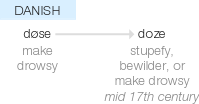Doze
mid 17th century (in the sense ‘stupefy, bewilder, or make drowsy’): perhaps related to Danish døse ‘make drowsy’.
wiktionary
From Middle English *dosen, from Old Norse dúsa(“to doze, rest, remain quiet”), from Proto-Germanic *dusāną(“to be dizzy”), from Proto-Indo-European *dʰews-(“to fly, whirl”), from *dʰew-(“to fly, shake, reek, steam, smolder”). Cognate with German Low German dösen(“to doze”), German dösen(“to doze”), Icelandic dúsa(“to doze”), dialectal Swedish dusa(“to doze, slumber”), Danish døse(“to doze”), Old English dysiġ(“foolish, stupid”), Scots dosnit(“stunned, stupefied”), Icelandic dúra(“to nap, slumber”), also compare Dutch doezelen(“to doze”). More at dizzy.
doze
etymonline
doze (v.)
"to sleep lightly or fitfully; fall into a light sleep unintentionally," 1640s, probably from a Scandinavian source (compare Old Norse dusa "to doze," Danish døse "to make dull," Swedish dialectal dusa "to sleep") and related to Old English dysig "foolish" (see dizzy). Perhaps originally a dialect word in English and earlier than the attested date. Related: Dozed; dozing. As a noun, "a light sleep or slumber," from 1731. To doze off is by 1829.
